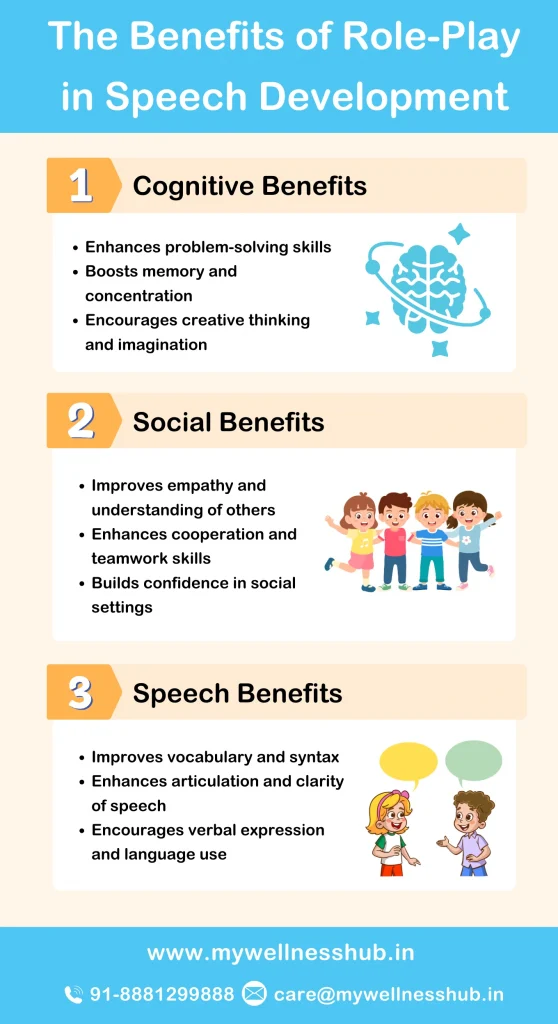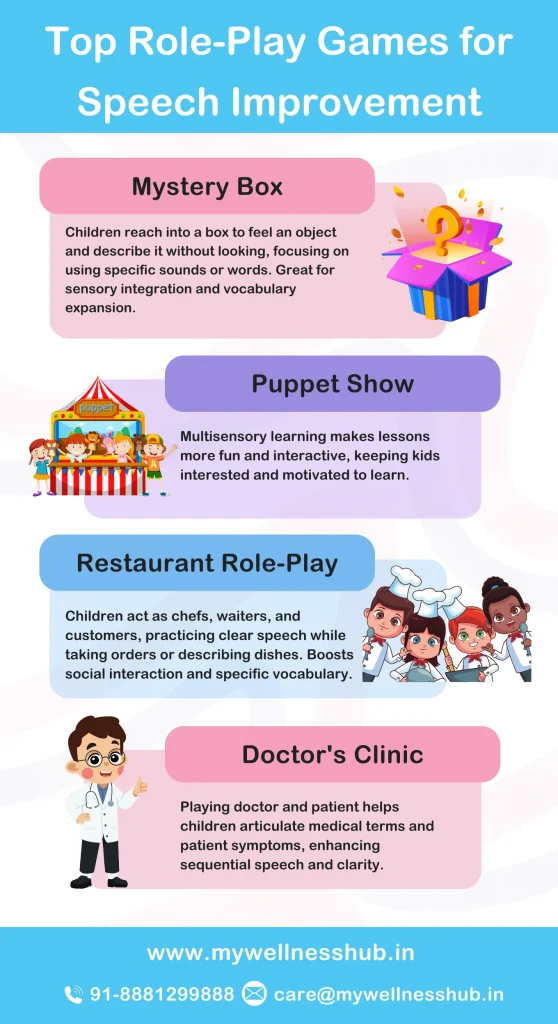Improve Articulation in Kids: Effective Role-Play Techniques
By Rajini D
Last Updated: January 15, 2025
Articulation is vital in early childhood as it lays the foundation for clear communication and confidence. Role-play, an engaging and effective strategy, helps children practice and enhance their speech in lively, real-world scenarios. By embracing role-play techniques, kids can transform their ability to articulate, making everyday interactions more meaningful and enjoyable. Let’s delve into how simple role-playing games can significantly improve your child’s speech development.
Book Your Free Speech Therapy Consultation
Understanding Articulation Issues in Children
When children begin to talk, their initial speech patterns might include cute mispronunciations. While many of these are normal, persistent difficulties in producing sounds correctly may indicate articulation issues. Common problems include substituting one sound for another (saying “wabbit” instead of “rabbit”), omitting sounds (“nana” for “banana”), and distorting sounds (slushy ‘s’ sounds). These challenges can make it hard for kids to communicate effectively, potentially impacting their social interactions and academic performance.
Also Read: Is It Normal for Kids to Mispronounce Words?
The Role of Role-Play in Speech Development
Role-playing is more than just a playful activity for children; it’s a critical tool in developing effective communication skills. By mimicking real-life conversations through role-play, children learn to articulate their thoughts and feelings in diverse scenarios. This method of interactive learning helps them understand the nuances of language, including tone, volume, and emotion, which are essential for clear communication.
Benefits of Role-Play for Cognitive and Social Development
Role-play does more than improve speech; it enhances cognitive and social abilities as well. It encourages children to think creatively, solve problems, and understand different perspectives. Socially, it boosts confidence and empathy, as children negotiate and collaborate with peers, playing different roles and responding to a variety of social cues. This holistic development is crucial in the early years when children are most receptive to learning new skills.
Role-Play Techniques for Improving Articulation

Engaging in role-play can significantly enhance articulation skills. Here are some effective techniques and scenarios:
- Doctor and Patient: Encourage your child to explain ‘symptoms’ and ‘treatments,’ focusing on clarity of speech.
- Store Clerk and Customer: This scenario allows children to practice everyday interactions, enhancing vocabulary and pronunciation.
Each role-play setting provides a unique challenge that helps fine-tune speech muscles and pronunciation skills. It’s important to choose scenarios that are both familiar and exciting to the child to maintain their interest and maximize learning.
Articulation Games for Children

To further support speech development through role-play, consider these engaging games:
- Mystery Box Game: Place objects inside a box and have children describe them using specific sounds or words.
- Puppet Show: Puppets are great for role-playing. Have children put on shows that require dialogue, focusing on articulation.
Know more about our article on Top 8 Engaging Articulation Games for Effective Speech Therapy
Role-Play Scenario Guide
| Scenario | Skills Developed | Age |
|---|---|---|
| Doctor and Patient | Vocabulary, Clarity | 3-7 years |
| Store Clerk and Customer | Social Interaction, Speech Clarity | 4-8 years |
| Superhero Adventure | Creativity, Expression | 3-6 years |
| Tea Party | Manners, Conversational Speech | 2-5 years |
| Puppet Show | Expressive Language, Storytelling | 4-8 years |
Tips for Organizing Role-Play Games at Home or in Educational Settings
- Create a Dedicated Space: Whether it’s a corner of a room or a specific table, having a dedicated space for role-play helps children transition into and out of play mode.
- Use Props: Simple props can make a significant difference in how children engage with the role-play, making it more realistic and enjoyable.
- Be an Active Participant: Join in the games. Your participation not only makes the activity more engaging but also allows you to model clear articulation and proper speech patterns.
Implementing Role-Play Techniques at Home
Introducing role-play techniques at home can be a delightful way to enhance your child’s articulation skills. Here’s a simple, step-by-step guide to make these activities both effective and fun.
Step-by-Step Guide for Facilitating Role-Play Activities
- Choose the Right Time: Pick times when your child is most energetic and receptive, such as after a snack or early in the day.
- Select Appropriate Scenarios: Tailor scenarios to your child’s interests. If they love animals, a vet clinic can be a fantastic setting.
- Prepare the Stage: Use everyday items around your house to create settings that inspire imagination. A table can turn into a market stall, or a couch into a doctor’s office.
- Dress the Part: Encourage your child to dress up. A simple hat or a stethoscope can make a big difference in how involved they get.
- Guide the Dialogue: Start by modeling dialogue that emphasizes the articulation points you want to practice. Then, let your child take the lead.
- Make It Regular: Incorporate role-play into your weekly routine to ensure consistent practice and better speech development.
Creating a Supportive Environment for Articulation Practice
- Positive Reinforcement: Always provide positive feedback to encourage efforts, regardless of how clear the articulation is initially.
- Patience is Key: Allow your child to express themselves at their own pace, without rushing or correcting them mid-sentence.
- Quiet, Comfortable Space: Reduce background noise and ensure the space is comfortable, making it easier for your child to focus and participate.
Monitoring Progress and Making Adjustments
Tracking your child’s improvement in articulation through role-play is crucial for adapting techniques to better suit their developmental stage.
- Keep a Speech Diary: Note improvements, struggles, and the contexts in which they occur. Over time, patterns will emerge that can guide further practice.
- Video Record Sessions: Occasionally recording sessions helps to visually and audibly track your child’s progress. Playbacks can also be insightful for the child to hear their own speech.
- Consult Professionals: Regular check-ins with a speech therapist can provide professional insights into your child’s progress and further tailor role-play scenarios to address specific needs.
Conclusion
Role-play is a fun and effective way to help your child speak more clearly. It transforms learning into an adventure, allowing kids to practice speech in real-life scenarios. Remember, consistency is key—regular role-play can significantly improve your child’s articulation. Be patient, and enjoy the journey of watching your child’s communication skills grow. For more creative role-play ideas, visit our resources page at Wellness Hub. Keep sessions light and enjoyable, and you’ll see your little one’s confidence and clarity blossom.
Frequently Asked Questions:
1. What is role-play and how does it help in speech development?
Role-play involves pretending to be characters in various scenarios, which helps children practice and improve their speech in a natural and engaging way.
2. Can role-play really improve my child’s articulation?
Yes, role-play can significantly improve articulation by allowing children to practice speech patterns and sounds in fun, interactive settings.
3. What are some simple role-play activities to start with at home?
Easy role-play activities include playing shopkeeper and customer, doctor and patient, or hosting a tea party with stuffed animals.
4. How often should my child engage in role-play for speech improvement?
Regular sessions are best. Try to incorporate short role-play activities into your child’s daily routine for consistent practice.
5. What should I do if my child gets frustrated during role-play?
Take a break and make sure to keep the atmosphere positive and pressure-free. Focus on the fun aspect rather than correct speech initially.
6. How can I track my child’s progress in articulation through role-play?
Keep notes on new words your child learns and how their clarity improves, or record sessions to notice subtle changes over time.
7. Are there specific role-play games that help with speech clarity?
Games like ‘Mystery Box’ where children describe objects or ‘Puppet Show’ that encourage dialogue can be particularly beneficial for speech clarity.
8. What age is best to start role-play for speech development?
Role-play can begin as soon as your child starts speaking. The sooner they start, the more they benefit from improved language skills.
9. Can role-play replace traditional speech therapy?
While role-play is beneficial, it should complement professional speech therapy, especially for children with significant speech delays or disorders.
10. Where can I find more resources on role-play and speech development?
Check out our comprehensive guides and tips on Wellness Hub’s resource page to get started with effective role-play techniques at home.
About the Author:
Rajini Darugupally
M.Sc., Speech-Language Pathologist (9+ years of experience)
Rajini is a passionate and dedicated Speech-Language Pathologist with over 9+ years of experience, specializing in both developmental speech and language disorders in children and rehabilitation in adults. Currently, at Wellness Hub, she thrives in a team environment that values innovation, compassion, and achieving results for their clients.
Book your Free Consultation Today
Parent/Caregiver Info:
Client’s Details:
* Error Message









